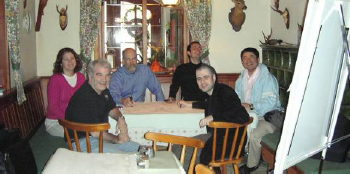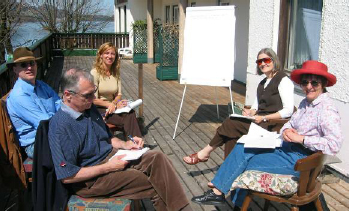IFSR Newsletter 2006 Vol. 24 No. 1 November

Proceedings of the Thirteenth Fuschl Conversation, Fuschl Conversation 2006, IFSR Newsletter 2006 Vol. 24 No. 1 November
In April 2006 the IFSR sponsored the 13th Fuschl Conversation. Conversations originated as an alternative to traditional conferences, and out of the insight that most of the benefit for participants resulted from the discussions and conversations with one another rather than from the formal content or presentations. The initial format for the Fuschl Conversations was built around Social Systems Design, as espoused by Bela H. Banathy.
In 2004 it became apparent that Conversation teams in Fuschl had, through the years, begun branching into a wide array of systems topics, also adopting a variety of approaches to their processes. In essence, the Conversations were evolving, but without clear or specific direction.
The 2006 Conversation provided a time for reflecting on a number of themes: the Conversation process and how it is evolving; the state of systems organizations as they relate to the IFSR and to each other; and most importantly, the future direction and role of systems organizations collectively. We bring short reports from the teams, details can be found in the proceedings:
Metcalf, G. and Chroust, G.: Proceedings of the Thirteenth Fuschl Conversation, April 22-27, 2006, Inst. f. Systems Engineering and Automation, Kepler Univ. Linz, 2006, SEA-SR-13}, ISBN = 3-902457-13-9}, 68 pages
Copies (10 €) can be ordered from Institute of Systems Engineering and Automation
Kepler University Linz, Altenbergerstr. 69, A-4040 Linz, Austria-
gc@sea.uni-linz.ac.at
Contents of the Fuschl 2006 Proceedings
| Welcome to the Fuschl Conversation 2006 4 Welcome to the Fuschl Conversation 2006 5 Fuschl 2006 – Aims and Objectives 6 List of Participants 9 Conclusions of Fuschl 2006 10 Topic 1: Fuschl Extension: Igniting a new Form of Conversation 12 Topic 2: Research and Dissemination and the IFSR 24 Topic 3: Infrastructure of the Systems Movement 31 Topic 4: The Status and Evolution of Systems Organizations 34 Topic 5: “Unity as a Part of Diversity” 42 Lessons Learnt – Fuschl 2006 Summary 52 Survey of Participants’ Opinions 55 Appendix: What is the IFSR? |
Team 1: Fuschl Extension
Igniting a New Form of Conversation
Team members: Christian Fuchs, Yoshi Horiuchi, Urban Kordes, Barbara Rivera, Gordon Rowland, Doug Walton
Our team formed to explore the conversation concept and associated methods in order to make specific recommendations regarding the future of Fuschl conversations. We considered whether and how such events should take place. Based partly on our own experience of the week, our answer to the former was an enthusiastic yes, and we proposed a new form of conversation that would extend Fuschl to local communities.
We arrived at Fuschl with unclear and/or mixed expectations. Some of us were aware of a perceived disconnect between the original Fuschl conversation goals and recent team activities, and the charge of making recommendations. Others joined the team purely to engage the general topic. We soon found common interests and developed triggering questions that would energize our conversation for the week.
Emerging from our conversation was a range of ideas and insights regarding the nature of conversation–the concept, key characteristics, techniques, and so on. A few samples include:
- Conversation involves opening and holding the space for ideas and stories to unfold; synergetic concepts emerge in this newly created space.
- Passion is more important than method, and interconnection ultimately makes the selection of a certain starting point unnecessary.
- The questions:
Who should be involved? And who is served? both have the same answer. - While systems science and design may offer much to society, our joy–our passion for dialogue–may be the gift with the most potential influence that we can share.

From left: Barbara Rivera, Doug Walton, Gordon Roland,
Urban Kordes, Christian Fuchs, Yoshihide Horiuchi, Fuschl Conversation 2006, IFSR Newsletter 2006 Vol. 24 No. 1 November
Three key outcomes from our work are:
- The Horizontal Flip Chart Method. We found that traditional presentation and recording by individuals on flipcharts created an intimidating performance aspect that diminished our creativity and collaboration. Placing flipchart pages horizontally on the table where all of us could add ideas, draw relations, and so on contributed to equality and synergy. In what we came to describe as interactive systems thinking, no single angle was correct and multiple angles yielded insights that would otherwise not have emerged.
- Fuschl Extension. As we explored the essence of Fuschl-like conversation, we realized that more might be accomplished by inviting Fuschl (i.e., systems scientists who attend the IFSR-sponsored event) to society than by inviting members of society (i.e., community members who might benefit from insights of systems science) to Fuschl. We created a model in which a small group of Fuschl attendees would join with members of a local community in co-inquiry with complementary goals. We completed a first round of development in terms of purposes, participants, criteria, logistics, and so on.
- Stories. We recognized the inadequacy of typical reports in capturing the lived experience of conversation. We attempted to do this better by writing our report as a story (see Fuschl Proceedings).
Our next step is to pilot test the Fuschl Extension, perhaps in association with Global Open Space 2007 (previously known as the Asilomar Conversation of the International Systems Institute).
Topic 5: Unity as a Part of Diversity
a new resource from the 2006 Fuschl conference
Team members: Gabriele Bammer, Maria Mercedes Clusellas Cornejo, Debora Hammond, Wolfgang Hofkirchner, Matjaz Mulej and Gary Metcalf.
Do you want to know who is working on unifying concepts for systems thinking?
Do you want to know what resources are available for developing unifying concepts?
Then go to: http://www.anu.edu.au/iisn/index.php?action=systems
One of the working groups at the 2006 Fuschl conference focused on core concepts underpinning systems thinking. It addressed the following questions:
- Who is working on core concepts for the integration of systems thinking?
- How can we achieve an integration of different approaches to systems thinking?
- How can we develop human capacities to accept an integration of different approaches to systems thinking (including worldview, ethics, and acceptance of differences)?
- Where do we find and how can we put into use a toolbox of system methodologies corresponding to detected/felt problems?
- How can we work against overspecialization, while still recognizing the importance of specialization, using transdisciplinary and interdisciplinary approaches?
The working group led discussions with all the Fuschl conference participants to identify people working on unifying or core concepts, as well as resources useful for such a task. These people and resources are now listed on a webpage at http://www.anu.edu.au/iisn/index.php?action=systems

(From left) Wolfgang Hofkichner, Matjaz Mulej, Maria Mercedes, Clusella Cornejo, Debora Hammond, Gabriele Bammer, Fuschl Conversation 2006, IFSR Newsletter 2006 Vol. 24 No. 1 November
We are looking to make the list as comprehensive as possible and to keep it updated. The webpage also provides information on how to add new resources or update existing ones.
